- Home
- Will McIntosh
Watching Over Us
Watching Over Us Read online
Begin Reading
Meet the Author
Bonus Material
About Orbit Short Fiction
Newsletter
Table of Contents
Copyright Page
In accordance with the U.S. Copyright Act of 1976, the scanning, uploading, and electronic sharing of any part of this book without the permission of the publisher constitute unlawful piracy and theft of the author’s intellectual property. If you would like to use material from the book (other than for review purposes), prior written permission must be obtained by contacting the publisher at [email protected]. Thank you for your support of the author’s rights.
Watching Over Us
A Defenders Story
Will McIntosh
www.orbitbooks.net
www.orbitshortfiction.com
Watching Over Us
There had been no fence or wall to mark the perimeter of the human-controlled territory in and around Pittsburgh, only a phalanx of tanks, howitzers, and concrete bunkers filled with heavily armed soldiers who were neither children nor old. Laurel’s seventy-year-old legs struggled to keep up with her platoon as they fled through the wreckage of that breached perimeter; she saw the burned and mangled bodies of some of those soldiers.
People were screaming down in the valley behind them, down in the city. The Luyten were tearing them apart, electrocuting them with weapons that looked like divining rods, burning them alive with mushroom-shaped heaters. The air stank of charred bodies. Fires raged in a hundred places, the smoke funneling to form one big cloud over the city.
The few soldiers on the perimeter who’d survived had turned their heavy artillery around, were firing into Pittsburgh.
“Lieutenant Carter?” Laurel called to her CO. “What about the people down there?”
Carter waved her platoon on, between two bunkers, waited for Laurel to catch up. “They have to get out best they can. We can’t worry about them.”
The only civilians left were either very old or very young—people who weren’t capable of fleeing. The thought of them huddled down there made Laurel want to die.
Carter lifted her head, shouted, “Straight down to the railroad tracks. Let’s move.”
Bad as Pittsburgh was, Laurel dreaded leaving it for the forests and fields, all of it Luyten-controlled territory. The closest safe haven, now that Pittsburgh had fallen, was Cleveland.
“How far is it to Cleveland?” she asked Lieutenant Carter, shouting over the artillery.
Carter shook her head. “We’re not going to Cleveland. We’re being sent somewhere else. I don’t know where just yet.”
A black dread washed over Laurel. They weren’t retreating to Cleveland? What else was out there but Luyten territory?
Of course even their chances of making it to Cleveland were slim to none. The first time they got within eight miles of a Luyten it would sense them, and come after them.
They reached the railroad tracks, which ran behind a tract of row houses, bending off to the right, beckoning Laurel’s platoon, promising an easy walk to their deaths.
* * *
“If it’s a rumor, why are they all saying the same thing?” Sergio, who was walking just ahead of Laurel, asked. Laurel had been thinking about a trip to Scotland she’d taken years ago with her husband, Mark, and her kids, Paul and Julie, all of whom were dead now. She hadn’t been paying attention to the conversation.
“Because that’s how rumors work: One wrong idea spreads,” Todd said. “I mean, giant soldiers? That’s the secret weapon? How would it help us to have bigger soldiers? This isn’t wrestling.”
“They kicked the Luyten’s asses down in Chile. That’s what Captain Noble said.” Sergio had a sticker of the Incredible Hulk on the back of his helmet.
“He did say that,” Jared chimed in.
At this point Laurel didn’t know what to think, so she stayed out of it. Giant soldiers? It sounded unlikely. But the details—that they’d retaken a power plant in Chile, that they were being created at production facilities deep below Manhattan, Moscow, Shanghai, and, of all places, Easter Island, were curiously specific and consistent. Diamond had picked up a short-wave transmission reporting the same thing Sergio and Jared had heard in the barracks.
But, giant soldiers?
Her legs were burning. No matter how hard she willed herself, no matter what trick she tried, Laurel could not widen the length of her strides. Her old hamstrings simply did not have any additional elasticity in them. It felt as if she had too-short steel cables attached from the bottom of her ass to the back of her knee.
Watching Sergio march along the railroad tracks in front of her, she gauged that she was taking almost two strides to his one. And he was only thirteen, and six inches shorter than she was. She could see right over his head as it bobbed along in front of her.
She burst out laughing.
Sergio hiked up his pants for the hundredth time since the platoon began the day’s march east, and turned to look at her.
“What’s so funny?”
“You ever hear the expression, ‘If you’re not the lead dog, the view never changes?’”
Sergio frowned. “I don’t think so.”
“Doesn’t matter. I was just walking along, thinking that saying isn’t true if you’re a head taller than the dogs in front of you.”
“Har-de-har-har,” Sergio said. A couple of the other young troops groaned.
“Maintain silence,” Lieutenant Carter, their lead dog, called over her shoulder. Carter wasn’t a head shorter than Laurel—she was the same height, carrying two hundred fifty pounds of beef, her brown skin mottled with burn scars from a close call with a Luyten heater.
Laurel wondered why silence was necessary. In a traditional war you were silent so the enemy couldn’t hear you coming, and to increase your chances of hearing them coming. Luyten could hear their thoughts, and if they heard Luyten coming, it was too late to do anything but say a prayer.
They cleared the stone ridge that had hugged the railroad track for the past mile or so, and a town came into view. Dead-end streets with ratty Cape Cods, a main street with a carpet outlet on the end. There was no one in sight.
“Where do you think we’re going?” Sergio asked.
“Probably to that pizza place,” Diamond said, pointing at the dilapidated, abandoned restaurant. In a few years Diamond would have become a cheerleader, with her long, skinny legs and pretty round face, but now those skinny legs only made it harder for her to carry a full pack.
“Right,” Sergio said, “we walked for two days to get pizza.”
“I’m joking,” Diamond said.
“I’d walk two days for pizza,” Todd chimed in, speaking over Diamond. He was sixteen, and usually stayed out of the sillier conversations.
“I’m guessing we’re headed for Cincinnati,” Laurel said. Often she felt more like a camp counselor than a soldier. She spent much of her time mediating pointless disputes while choking back tears at the thought of these kids being slaughtered by jewel-colored aliens the size of elephants.
“I bet they’re taking us to rendezvous with the ‘secret weapons,’” Jared said. He’d pulled out his little game player, was using some of its precious battery power, somehow playing his basketball game while simultaneously watching where he was going. Laurel had no doubt he’d been a popular kid in school back in Queens, with his big brown eyes and dimpled smile. In that world he and Sergio never would have become friends. Sergio snorted when he laughed, and had no interest in basketball unless superheroes were playing.
“There ain’t no secret weapons,” Diamond said. “Every couple of months there are rumors of something that’s going to save us, and it always turns out to be bullshit.”
She yanked at one of the shoulder straps on her pack, trying to tighten it.
“Well, Lieutenant Carter told me it’s true this time,” Jared said. His voice hadn’t even changed yet. “She said there’s something in the works, and it’s going to change everything.”
Up ahead, the tracks met up with a small river and curved right along the bank.
“She’s a lieutenant,” Diamond said. She was behind Laurel, so Laurel couldn’t see her rolling her eyes, but knew she was. “They don’t tell her anything. You think they’d tell her about a secret weapon so the starfish can pull it out of her head?”
Laurel smiled wanly. Diamond’s logic was airtight. The only people who knew what was going on were miles underground, plotting hopeless strategies and doling them out a scrap at a time. Not that it had helped much against an enemy that always knew how many troops were headed their way, what weapons they were carrying, and, when it mattered, which way they were pointing those weapons.
Before she could cut off the thought, she was assaulted by an image of her daughter, Julie, clutching a rifle, perched on her toes, trembling furiously, her hair smoking.
Laurel squeezed her eyes shut, tried to banish the image. It was usually Julie she thought of, because she’d watched Julie die. Mark, Paul, their grandkids had all died far away. Sometimes she could delude herself into thinking they’d died quickly. Not Julie, though.
A dozen yards ahead, Lieutenant Carter blew her whistle. “Early camp today. Rest well.” Her red-rimmed eyes flicked from one recruit to the next, assessing the impact of her words, or perhaps trying to burn the significance of those words into these children.
Tomorrow, you will probably die. And so will I, she was saying.
Dinner was a treat: MREs, your choice as long as they lasted. Laurel picked corned beef and cabbage with mashed potatoes, and sat with her kids. The other two adults of legal age in their platoon—Pete Casing, an auto mechanic in his sixties, and Rob O’Neill, a retired advertising exec who had to be five years older than Laurel—ate with their own group of adopted comrade-children. They’d fallen into the arrangement without ever discussing it. It just made sense.
The evening sunlight shimmered off the water. Laurel appreciated reflected sunlight more than she had before the invasion. Anything that was the same as it had been before the Luyten dropped out of the sky, twisting and spinning like huge starfish, was precious.
“I’m gonna go swimming,” Jared said, licking the last of the vanilla pudding from its plastic container.
“No, you are not,” Diamond said. “The water’s probably polluted. Plus it’s too cold out.”
Sergio hopped up, ran down to the weed-choked shoreline, and dipped his hand in the shallow water. “It’s warm.”
Jared and Sergio looked at each other, grinning uncertainly.
“Should we?” Jared asked Sergio.
“I will if you will.”
Jared pulled his shirt over his head, exposing rows of ribs. He tossed it on the ground a few feet from the gently lapping waves as Sergio ran to join him, pulling off his uniform until both were in nothing but white underpants, wading in on their skinny stork legs, hugging themselves in the chill air.
Laurel expected Lieutenant Carter to shout the idea down, but she only eyed them from under the bill of her cap, eating fruit salad from a can with a white plastic spoon.
Shrieking, the two boys splashed into the water. It was three feet deep at most; they dunked themselves to the neck.
There had come a day, maybe ten years earlier—six years before the Luyten invaded—when it had suddenly occurred to Laurel that she likely had more fingers and toes than birthdays left. Less than twenty Christmases left. Less than twenty summers. The time ahead had once seemed all but infinite, then suddenly it was all too finite. Today, she could count the days ahead on one hand.
Laurel stood, unbuttoned the top button on her uniform blouse.
“What are you doing?” Diamond asked, her nose scrunched in disgust.
“I’m going swimming.” For the very last time.
The kids stared at her loose, wrinkled skin. She’d been pretty once—not cheerleader-pretty like Diamond, but not bad. Now she was all saggy skin and age spots. Today, she didn’t care.
Sergio had been full of shit; the water was freezing. It felt good, though—it made her aware that she was alive, helped her drink in the feel of water pressing her old limbs, the scent of mud and fish.
The Lieutenant watched as half a dozen others stripped and took to the water, screeching, splashing, laughing. This time, she didn’t reprimand them to maintain silence.
Bobbing in the shallow water, Laurel watched the Lieutenant watching her troops. She’d managed a Wendy’s before being drafted two years earlier, so she was used to supervising teenagers. Laurel smiled, remembering what Carter had said when one of the troops pointed out how lucky Carter was that the Luyten hadn’t gotten her yet.
It ain’t luck, she’d said. It’s about knowing when to run.
* * *
A scream jerked Laurel awake. It was still dark, the air icy cold on her face.
“Mom. Mom.” It was Jared.
Laurel shoved her boots on, went to Jared, who was sitting up, his breath coming in gasps.
“A nightmare?” she asked, sitting on the cold dirt beside him.
Jared swallowed, nodded. “I was at the movies, with my mom and my sister, Jenna. Then when I looked around, they were gone. All the people were gone, and the theater was filled with Luyten. They were all around me, watching the movie, and I knew when it was over they were going to kill me.” Jared started crying.
Laurel put a hand on the back of his shaved head, pulled him to her, patted his back. Nights were the hardest. These kids had been given no choice but to grow up quickly, but in the middle of the night, when their guards were down, they turned into children again.
“Do you want me to get my things and sleep here?” Laurel asked.
“Okay.”
Laurel dragged her blankets over and pressed close to Jared.
“I miss my mom and dad,” Jared said as the dark leaves overhead clattered in a crisp wind. “Everyone else has it the same, I know. I just have to suck it up, but—”
Laurel put her hand on his head. “Just because everyone else lost their parents doesn’t make it hurt any less that you lost yours.”
She felt Jared’s shoulders jerk as he cried quietly.
“Everyone’s hurting,” she whispered. “Everyone. Even Lieutenant Carter. It’s okay to hurt.”
The soft rustling of blankets nearby made Laurel turn. Diamond was standing over them, pillow in one hand, blanket in the other.
“Can I sleep here?”
Laurel patted the ground.
It was comforting to have warm bodies pressed close on either side. It reminded her of camping out with her own kids thirty years earlier, up in Maine. Acadia National Park. That was the year Mark had so much trouble with nightmares, the vivid imagination he would channel into a career in computer animation still running out of control. Sleeping in a tent in the dark woods had terrified Mark, and they’d had to cut their vacation short. At the time the trip had seemed like an utter disaster. Laurel would give anything to be back there.
“I know they’re coming for us,” Diamond whispered. “I don’t know why they’ve waited this long.”
Sergio appeared out of the darkness, dropped his blankets next to Diamond. “I tried talking to them.”
Jared raised up on one elbow. “What do you mean?”
“They can read our minds, so I talked to them, kind of like I say my prayers. I asked them please not to kill me.”
“Why don’t you ask them for a pony while you’re at it?” Diamond said.
“It’s a chance, at least.”
Laurel shushed Sergio. “You’re going to wake the others.”
In a lower voice, Sergio said, “I’m only telling you because I thought you might want to try it, too. What could it
hurt?”
It was nothing but fantasy, but Laurel kept her mouth shut. If it took the edge off Sergio’s fear, let him believe Luyten could be bargained with.
No one spoke after that. Laurel wondered if Jared and Diamond were praying to the Luyten for mercy as well.
* * *
The line slowed. Laurel caught her foot on a railroad tie, nearly fell. Ahead, the way forward was blocked by a pile of broken machinery. They were on a trestle, thirty feet above a stream, so the platoon was forced to climb over the debris.
When it was her turn, Laurel picked her way carefully over jagged, crushed steel.
“Drones,” Todd said. “They’re all drones.”
That’s exactly what they were: walking artillery pieces, designed to wander randomly, seeking Luyten through VRE technology. Luyten couldn’t read their computer-chip minds, so they couldn’t avoid their gunfire the way they did humans’ gunfire. The problem was, once the Luyten knew where one of the drones was, it wasn’t difficult to take out a machine. They could have more easily pulled up railroad ties to block the route, or simply burned it; the barricade was meant to be a message about the drones’ lack of effectiveness, a morale stomper to any soldiers passing through. Beyond the blockade the track veered deeper into pine forest.
A cry of alarm rose from up the line. Laurel swung her rifle off her shoulder and pointed it into the trees, looking for bright colors. Cobalt blue, magenta, emerald, mustard…
A huge figure broke from the trees, clutching a rifle the size of a bazooka. It was manlike, but not a man: deep-set eyes, a ridged brow, skin as white as bone, black uniform. He had three legs, which made him fast. So fast.
The entire platoon gaped, struck dumb by the sight of the creature as it headed north on the tracks, eyes straight ahead, exhaling through its nose like a winded colt.
Three more burst from the trees; then there were six, then ten, as more appeared farther up the track.
Cheers rose in the platoon, growing to a full-throated roar as, one by one, the giants disappeared around a curve in the track.

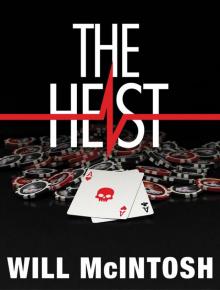 The Heist
The Heist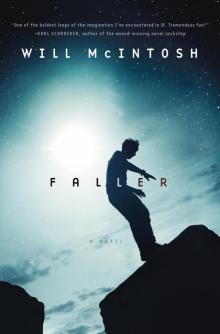 Faller
Faller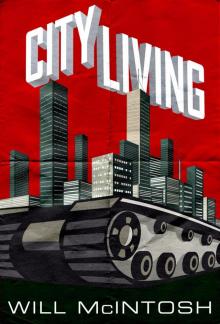 City Living
City Living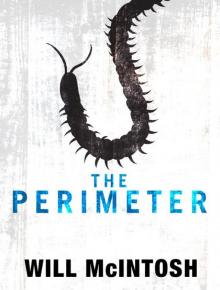 The Perimeter
The Perimeter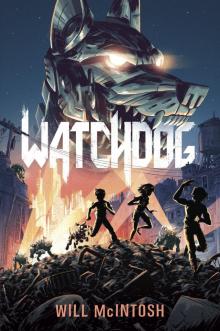 Watchdog
Watchdog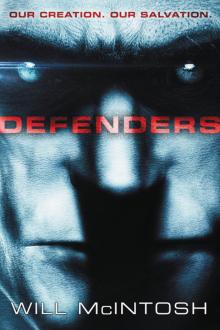 Defenders
Defenders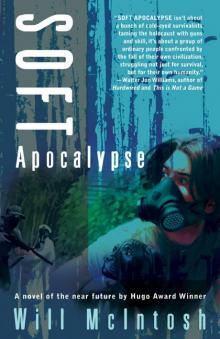 Soft Apocalypse
Soft Apocalypse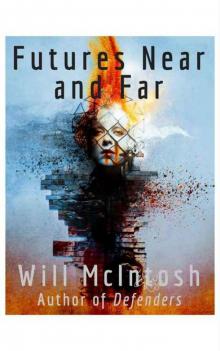 Futures Near and Far
Futures Near and Far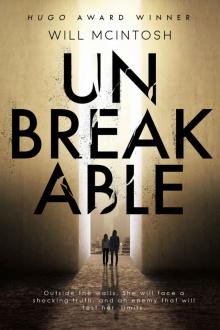 Unbreakable
Unbreakable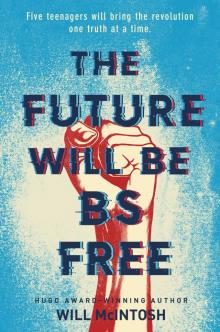 The Future Will Be BS Free
The Future Will Be BS Free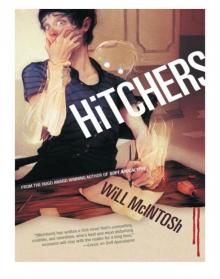 Hitchers
Hitchers Burning Midnight
Burning Midnight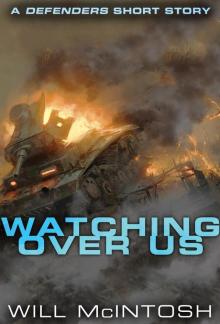 Watching Over Us
Watching Over Us